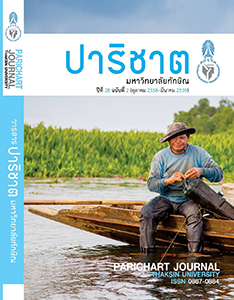What Thai Science Teachers Should Learn From The Programme for International Student Assessment
Main Article Content
Abstract
ประเทศไทยเข้าร่วมโครงการประเมินผลนักเรียนนานาชาติมาตั้งแต่ ค.ศ. 2000 แต่การประเมินทุกครั้งที่ผ่านมาให้ข้อมูลว่า นักเรียนไทยยังคงทำคะแนนได้ตำ่กว่าคะแนนเฉลี่ย ของนักเรียนจากประเทศอื่น ๆ บทความนี้นำเสนอการวิเคราะห์ตัวอย่างข้อสอบที่มีการเผยแพร่ สู่สาธารณะ ร่วมกับการพิจารณาคะแนนของนักเรียนไทยในอดีต ผ่านมุมมองของการสืบเสาะ ทางวิทยาศาสตร์ ทั้งนี้ เพื่อระบุสิ่งที่จำกัดการพัฒนาความสามารถด้านวิทยาศาสตร์ของ นักเรียนไทย ผลการวิเคราะห์นี้เปิดเผยว่า ลักษณะที่ปรากฏบ่อยที่สุดในตัวอย่างข้อสอบ เหล่านี้คือการตั้งสมมติฐานและการคาดการณ์คำตอบที่เป็นไปได้ ในขณะที่นักเรียนไทยทำ คะแนนด้านการโน้มน้าวและการโต้แย้งทางวิทยาศาสตร์ได้น้อยที่สุด ซึ่งเป็นลักษณะที่ยังไม่ ปรากฏอย่างชัดเจนในหลักสูตรแกนกลางการศึกษาขั้นพื้นฐาน พุทธศักราช 2551 บทความนี้ ได้เสนอแนะแนวทางในการยกระดับคุณภาพการจัดการเรียนการสอนวิทยาศาสตร์ในประเทศไทย
What Thai Science Teachers Should Learn From The Programme for International Student Assessment
Luecha Ladachart and Chokchai Yuenyong
Thailand has been participated in the Programme for International Student Assessment since 2000. But, all of its results have informed that Thai students still gained scores on scientific literacy lower than the average of those from other countries. This article presents an analysis of public test examples with consideration on Thai students’ past scores through a view of scientific inquiry in order to indicate what limits Thai students to develop their scientific abilities. The results of this analysis reveal that the aspect that most frequently appears in the test examples is formulating hypotheses and predicting possible educated guesses, while Thai students performed worst on scientific persuasion and argumentation, which not explicitly appears in the 2008 Basic Education Core Curriculum. This article suggests ways to enhance the quality of science teaching and learning in Thailand.


